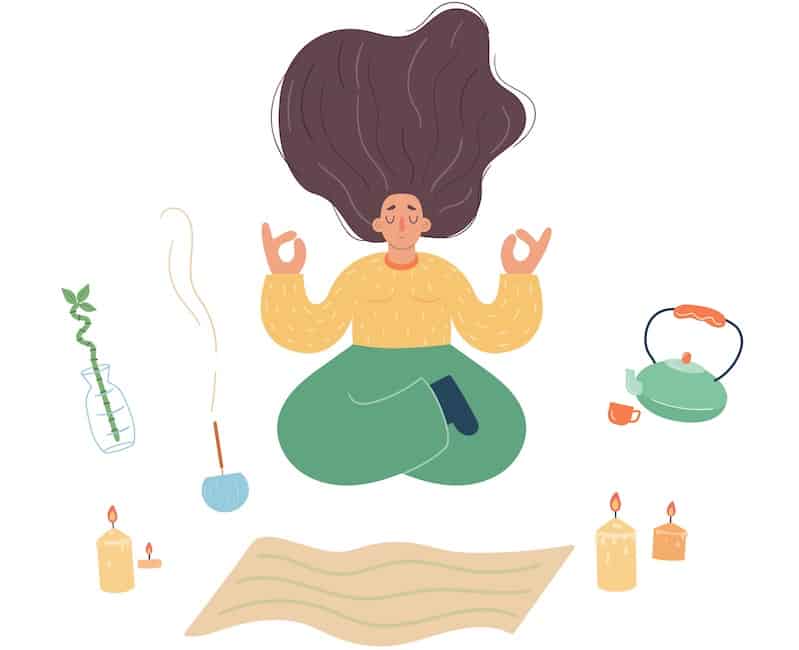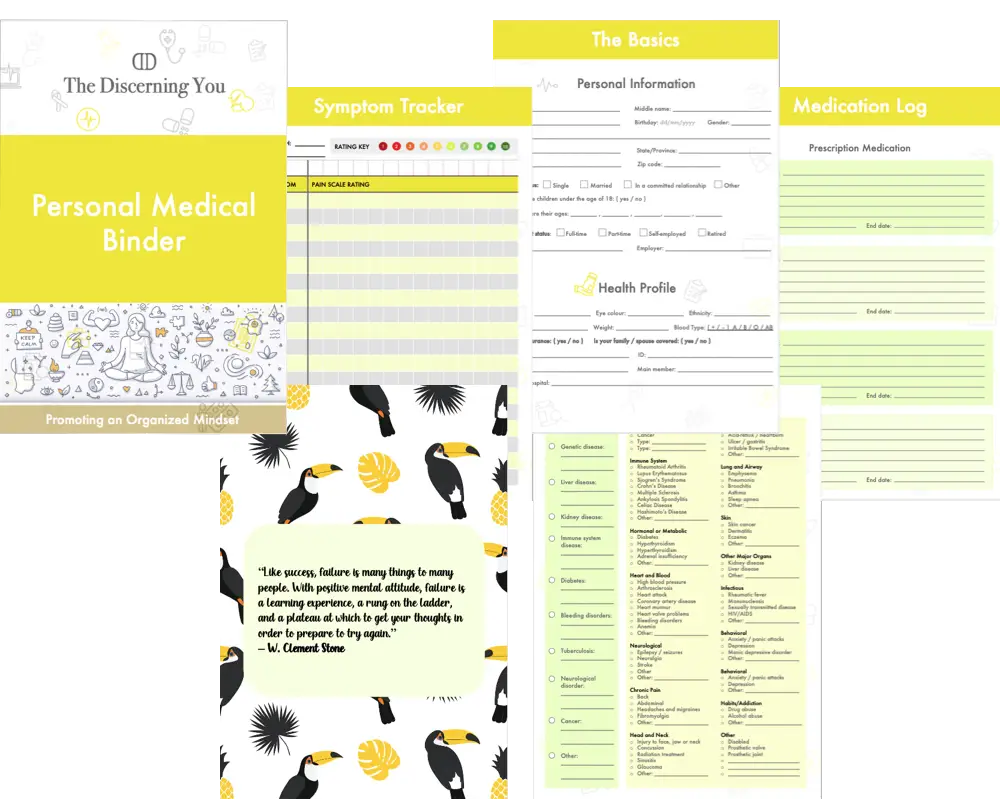There’s no need to sugarcoat the truth – living with a chronic illness can suck! There are so many new things that you need to learn to deal with, and it gets overwhelming. So if you feel ready to close yourself off from the world and quit because it’s all too much – here are some things that have helped me in my darkest times.
Feeling overwhelmed is strange because it affects us differently depending on our coping mechanisms.
If you’re like me and you naturally shove your feelings to the back of your mind and pretend like they don’t exist – you probably feel fine for extended periods until one trigger sets off intense feelings of crippling overwhelm.
Then, all your fears, concerns and issues flood your brain all at once, and you break down.
But you may also find that you just don’t have the coping mechanisms needed to deal with trauma you never thought you’d experience and have no idea where to turn.
I realized how poorly I was managing my feelings when I gradually lost all leg mobility in 2010. It was just before my diagnosis and I had no idea what was happening to my body as it slowly went limp.
I tried to keep a brave face and smile – I promised myself I would never talk about the issue unless it was in a joking manner. In my mind, talking about my body made the problem more real, and I would be heightening the issue more than necessary.
After months of little sleep, terrible pain, and so much fear – I was finally given my first potential diagnosis. I decided then that it was time to tell a friend what was happening.
As we met in public, I started shaking. I did my best to lock eyes with her, but as I tried to say the words “the doctors think I might have a debilitating chronic illness”, all I could utter were the words, “I might never walk again”.
At this point, I burst into tears, let go of my crutches as I screeched at the top of my lungs and curled into a small ball on the floor.
That was my first mental breakdown and, thankfully, the transition into really helpful (and needed) therapy.
It takes time to learn how to cope with overwhelm, but these 23 things have helped me manage different challenges at different phases of my journey.
Keep a Journal to Break Down Your Overwhelming Feelings

When you feel overwhelmed, and there’s nothing that seems to help you calm down – putting pen to paper has therapeutic benefits.
This is because it gives your racing mind a chance to unload its thoughts in a more structured manner and a safe space. So if you don’t have a journal – here’s your queue to get one!
Here are some things I have felt overwhelmed with in the past, just to give you a few examples:
- I am struggling to keep up with work deadlines, and I feel like I will lose my job.
- I’m in a wheelchair now, and I feel helpless around the house.
- I can’t explain my pain to my family, and no one understands me.
- Summer is coming, and I don’t want people to see all my scars at the beach.
- I hate using my walking stick because I get interrogated by the public.
Use Your Journal to Mind Map Possible Solutions to Each Overwhelming Problem
Do you have your chronic-illness journal now? Good! Because it ties in perfectly with this task.
Start by looking at the overwhelming thoughts you listed in your journal and approach each bullet point one mind map at a time. (Bite-sized problems and solutions).
For example, if you’re worried about your job, you can:
- Chat to your doctor about non-invasive ways to build your energy levels.
- Do some research into state disability benefits.
- See if there are less stressful jobs you could apply for at this stage.
Be patient and try to tackle one (maximum two) points at a time. Give yourself lots of paper to draw your mind map out.
Once one is resolved, you can move on to the next one. And it’s okay if they take a long time to fix – the point is that you’re working on it.
I like to give myself one long term and one short term issue to resolve at a time so that it feels like I am making more progress day by day.
Schedule Events To Stop Brain fog from Causing Overwhelm
Unfortunately, chronic illness can affect your short-term memory. Trust me – I know. I can have bad brain fog that leaves me feeling anxious and overwhelmed when I fall behind on things I need to do.
Often, I can’t remember what responsibilities I have. So when events are constantly springing up on you, it becomes too much to handle.
Whether it’s on your phone, laptop or old-school diary – I recommend making your calendar your best friend.
I like online calendars because you can invite other people to see your “events” as well.
That way, it reflects in both our diaries and I don’t forget about mentioning essential things.
Managing brain fog when you’re chronically ill isn’t easy. If you’re struggling with this right now, I recommend reading more here: The 9 Best Ways to Clear Brain Fog When You're Chronically Ill
Think About Your Body in a Positive Light to Build Inner Strength

“Until you make peace with who you are, you will never be content with what you have.” ~ Doris Mortman
These are some wise words to live by.
No, your life probably isn’t what you imagined it would be.
And you may not have achieved the goals you initially set out to.
But even though it feels like it’s your body’s fault that your life has ended – that is NOT true.
Your body has miraculously dealt with so much, and it deserves respect. YOU deserve respect.
Challenge yourself every morning by saying the words:
“THANK YOU, body. No matter how much emotional strain I internalize and how much weight I take on my shoulders – you fight your hardest to give me life. I appreciate that you’re doing your best, and I LOVE YOU.”
Stop Idealising Who You Should Be So That Who You ARE Can Grow

“When we cannot find contentment in ourselves, it is useless to seek it elsewhere.” ~ Francois La Rochefoucauld
Your old life may be fading, but a whole new one is cultivated from your new experiences. Who would have thought you could develop such resilience and strength so quickly?
We can’t have complete control over each personal goal we want to achieve in life. Things happen in our environment that we have to adapt to. And this is what you should prize yourself as – before anything else.
You are a warrior who copes with life’s changes.
And you make do with what you are given.
You will go far because you’ve learnt to harness the turbulence in life to benefit you instead of simply being thrashed to the floor.
Channel Your Overwhelming Thoughts to Improve Your Outlook on Life
Being happy does not mean embracing toxic positivity. You can leave that fake attitude behind! Being happy is a way of life, and it’s a mindset you choose
An excellent way to start is by changing the words you use to speak and thinking about your health when you feel overwhelmed by your chronic illness.
So next time that judgemental voice in your head says: “Seriously? How can you be tired again.” Or “What? You can’t even hold down this job, you idiot.”
It’s time to tell your brain to STOP it!
These are all anxiety-driven, negative thoughts that worsen your overwhelming feelings.
Adjust the way you speak to yourself. Approach it like you would when a friend needs help. For example, if you’re tired, acknowledge that your body deserves the rest. If you can’t work any longer, feel comfortable knowing you did your best.
Everything you do from here is to help you walk away from stress and accept the anxiety you know you have.
Here’s an excellent article for you to read if you want to kick toxic positivity in the butt: 100 Affirmations For Chronic Illness That Actually Work
Use Healthy Thought Replacements to Stop Self-Criticism
The minute you feel negative, daunting or anxiety-ridden feelings come back – you can manage it by keeping an objective perspective.
Write down your concerns and give each one a healthy thought replacement. Remember to provide a healthy thought replacement with advice you’d feel comfortable giving to a friend.
Use your journal to help you out here.
Concern → | Healthy Thought Replacement |
|---|---|
I don’t know what I’m doing. | I have the opportunity to learn something new. |
I’m going to f*ck it up. | No one can overcome an obstacle without making and learning from their mistakes. |
I've tried this before and failed. | I’ve tried this before and have adapted and grown from my mistakes. |
It's too hard. | I am resourceful enough to make sh*t happen. |
I'm just not good enough. | I am strong, resilient, brave and intelligent – I can do anything I want. Bring it on! |
This table is extracted from our 7 Days to Happiness Programme. If you want more interesting activities and visual aids like that – SIGN UP!
The programme is absolutely free (no hidden costs, I promise!): 7 Days to Happiness Programme
Don’t Compare Yourself with Others. Stay Focused on YOUR Path
One way to build overwhelming pressure is continuously comparing yourself with others.
Even if that person has the same chronic illness as you – your lives are not the same. Your obstacles are not the same. And the lessons you need to learn are not the same.
Don’t let someone else’s success demotivate you or pressurise you. As long as you keep moving forward to the best of your ability, nothing else should matter.
You’ll know you are starting to be happy from within when someone else’s success does not bother you – it inspires you.
Set Ten Minutes Aside to Breathe Slowly and Lower Cortisol Levels
We live in a world where everything is fast-paced. Any deadline you have is due a day before it’s even issued to you.
Our bodies are not machines. We cannot configure ourselves to show results within a specific time by a particular date. A large part of feeling overwhelmed by your chronic illness is because of this.
No matter how advanced the world’s productivity gets – we need to remind ourselves that we’re still human and need to respect our bodies limits. The one thing we all need to do is BREATHE.
Deep breathing is a known way to evoke your body’s relaxation response by calming your sympathetic nervous system (responsible for fight or flight).
Read this Harvard article on how to breathe deeply for some tips and techniques.
Use Goal Tracking to Remind Yourself That You Can Cope

Your soul needs to be nurtured every day. You’re not just a body that needs to be fed, bathed and rested. You’re a whole human being that needs to grow and feel fulfilled emotionally too.
It’s time to forgive yourself for all the unnecessary pressure you’ve put yourself under. To acknowledge the strength you already have and the remarkable milestones you’ve already reached.
Use your journal to stick photos of any progress you make and note it. Even if all you do is learn to wiggle your little toe again – you need to respect how hard it was to get that right.
In moments when you feel down or behind, that’s when you can whip out your journal and page through every single little success you’ve already had. Fuel your spirit with the motivation to move forward and forget about the rest.
Clear Your Focus by Drawing Attention to Helping Someone Else
Another great thing to do is take some overwhelming focus off yourself and direct it to someone who needs help.
You’d be surprised how your problems and fears all seem to become less threatening when you focus your attention on an issue that’s bigger than yourself.
Not to mention it makes you feel 100 times better knowing that you’ve helped someone else.
Why?
Because much like your achievements, occupation or financial status – a chronic illness is something you have. It does not define who you are. When you do good for someone else – it reminds you of this.
By building yourself a value-based life – any overwhelming feeling will feel manageable because you are clearly focusing on what’s important to YOU.
We discuss HOW you can do this in our FREE 7 Days to Happiness Programme. Enrol here: 7 Days to Happiness Programme
Use Mindfulness First Thing in the Morning to Clear Your Head

Sometimes I find having a chronic illness is a blessing because it’s given me more time to learn about who I am and how I relate to the world around me.
Guided meditation and mindfulness are helpful because it makes you appreciate what is happening in your life and stop you from worrying about future events that you have little control over.
When you sit in a non-judgemental space on your own, and you’re forced to use mind power to control the direction of your thoughts – you become so powerful.
Meditation shows you that you cannot run away from yourself. Only learn and grow.
- Mindfulness has proven to help people cope with chronic pain by reducing their perception of the pain and increasing their pain threshold.
- Mindfulness has proven to build or even rebuild healthy neural connections in the parts of your brain associated with learning, memory, stress and anxiety.
- People who practice mindfulness meditation for 20 minutes every day have better insights and perspectives on their own lives. This means that they are more capable of processing information, making informed decisions and solving their problems.
Develop Key Relationships with People You Feel Comfortable Opening Up To
Much like writing down a list, reaching out for help is another great way to vent your feelings and clear your mind.
If you feel like you have someone trustworthy around you – speak to them. Ideally, you want someone who will be there to listen to you and not give you unsolicited advice.
Each one of us has different relationship needs depending on our personality traits. For example, if you suffer from anxiety, you might benefit from having a grounded and logical friend.
It’s important to understand what you need, depending on your own personality and what you can offer others.
There are four essential social needs that can be divided into the following categories. Each one has different aspects that may be more important to you than others: Emotional, instrumental, appraisal and informational.
Try Cognitive Behavioural Therapy (CBT) to Cultivate a More Rational Thought Process

No matter what situation you are in – you will find that your emotional response is directed by instinct and memory. It’s not consciously controlled, and you can’t help what you feel.
So it’s normal to feel specific emotions at certain times. But that does not mean they should be dismissed as they reflect your subconscious thought process and survival instincts.
By identifying the triggers that cause you emotional distress – you can also find ways to move past them. CBT is an excellent form of therapy that can help you improve your coping skills.
I would advise finding someone who specialises in helping people with chronic illnesses as they have some coping tools of their own that you could try out.
Get Help Around the House So You Can Focus on Self-Healing
The other way that I would recommend enlisting help is with day-to-day life management—for example, cleaning the house, running errands, shopping, or even looking after kids.
This is definitely a luxury, but if it’s within your budget – do it.
It’s okay not to do everything by yourself. Sometimes sharing the load can help you keep much stronger and more present every day.
However, if you find cleaning relaxing, use that time to think and breathe. Here are some cleaning tips for anyone with a chronic illness: 5 Ways to Make Cleaning Easier When You Have a Chronic Illness
Get Involved In a Project That Gives You Purpose
One of the best ways to settle down when you feel overwhelmed by your chronic illness is just to get up and do something.
It doesn’t matter what; it just needs to be something you enjoy that makes you feel productive.
Whether you dedicate your time to a part-time job, home business, non-profit organization or even studies – it needs to be something that makes you feel productive.
Use this opportunity to remind yourself that your chronic illness does not have to define who you are. If anything, it can empower you to become who YOU want to be.
Set Boundaries with People To Prevent Your Personal Space From Becoming Overwhelming
Boundaries make it much harder for people to impose their thoughts on you and control your actions. It also makes it easier to say no when you need to.
Setting personal boundaries gives you the time to practice self-care in whatever way you want to. It allows you to preserve and grow your knowledge, skills, abilities, purpose and mission.
So if your mission is to find a productive way to deal with your chronic illness – you have the right to ask for space to get that done.

Keep as Active as Possible to Boost Your Mood Naturally
Spending too much time alone with your thoughts can make you feel very lonely and overwhelmed.
So even if you’re just moving around your house – it can give you a fresh perspective on whatever you’re ruminating about.
Talking to a friend, going for a walk or even just moving from your bedroom to the lounge can be refreshing.
Plus, moving and getting your oxygen flowing boosts serotonin, calm your nerves and get you to focus on something other than the issues you’re experiencing.
Focus on Your Strengths So That You Develop Inner Resilience
When your health isn’t at its best, it’s hard to acknowledge any good things happening in your life right now.
But if you want to build your resilience, you’re going to have to acknowledge the weaknesses in your life and put them aside to focus on the strengths in your life.
If you’re incredible at cooking but struggle to chop up veggies anymore. Get someone to help you cut them up – or buy them precut!
Don’t let yourself focus on the painful process of chopping vegetables when you could be focusing on a fantastic meal you’re preparing – it’s not worth it!
Associate Rest With Pleasure Not Punishment to Ease Feelings of Guilt

Looking after yourself is necessary if you want to cope with the anxieties of life and help others along the way.
Resting is necessary. It’s medicine for your mind and your body. And it’s never something that you should feel guilty or ashamed for doing.
So next time you rest – stop beating yourself up with overwhelming feelings of guilt.
Remember that:
- No one can tackle life if they’re not well equipped for it.
- We’re all susceptible to injury and pain, so we should be more compassionate to others.
- If we don’t look after ourselves – how can we look after others?
Try These Self-Care Rituals to Focus on Positive Improvements
Here are some of my favourite self-care rituals that can help you build positive habits in your life:
- Take a day (or two) to reset. Spend non-judgemental time alone to self-soothe.
- Opt-out of group activities when you need it and exercise your power to say no.
- Treat yourself to a massage or any mood-boosting beauty treatment.
- Sleep – like a lot. This does wonders for your mood and motivation.
- Eat well. You can’t expect your body to work properly without the right fuel. Here are 12 Energy-Saving Cooking Tips When You're Chronically Ill to try.
- Do some exercise to alleviate anxiety and get some blood back to your brain. Yoga for chronic illness is a great option.
- Go for a walk. It doesn’t matter where – just move and get fresh air.
- Read a book or watch a movie – or both!
- Call or spend time with a friend – spending time with the people you love should feel relaxing and re-energising.
Forgive Yourself When You Can’t Control Your Feelings
“There is no sense in punishing your future for the mistakes of your past. Forgive yourself, grow from it, and then let it go.” ~ Melanie Koulouris
Whenever you feel you just can’t manage to clear your mind – it’s okay. Gently remind yourself that it’s okay to have millions of concerns and be anxious. This process takes time and patience to get right.
And you can’t improve by punishing yourself – only learning and growing.
Say to yourself, “Okay, brain, I know this is hard, and I know you’re doing your best. We might want to focus on the bad stuff, but I’m going to keep directing us to the good. When we don’t get it right – we try again.”
Use a Medical Binder to Track Your Progress and Remind You of Your Accomplishments

I’ve listed many things you can do to help you cope with overwhelm – from understanding resilience, setting boundaries, doing mindful meditation, building friendships, keeping a journal and tracking your goals.
So to help you out, I’ve created a short medical binder that will help you implement almost every point we’ve discussed in this article.
It’s completely FREE; all you need to do is download it here:
And if you liked this article and want to learn more about ALL these topics – you must sign up for our FREE 7 Days to Happiness programme, where we share information, activities, charts, printables and an EXTENDED MEDICAL BINDER that you will love.
No hidden costs – I promise you! I know how expensive medical care is – so, this is all here to help you. Enjoy: 7 Days to Happiness Programme
Let me know if you found my techniques to be useful or if you have any other suggestions you think I should know about. I'd really like to hear from you!
